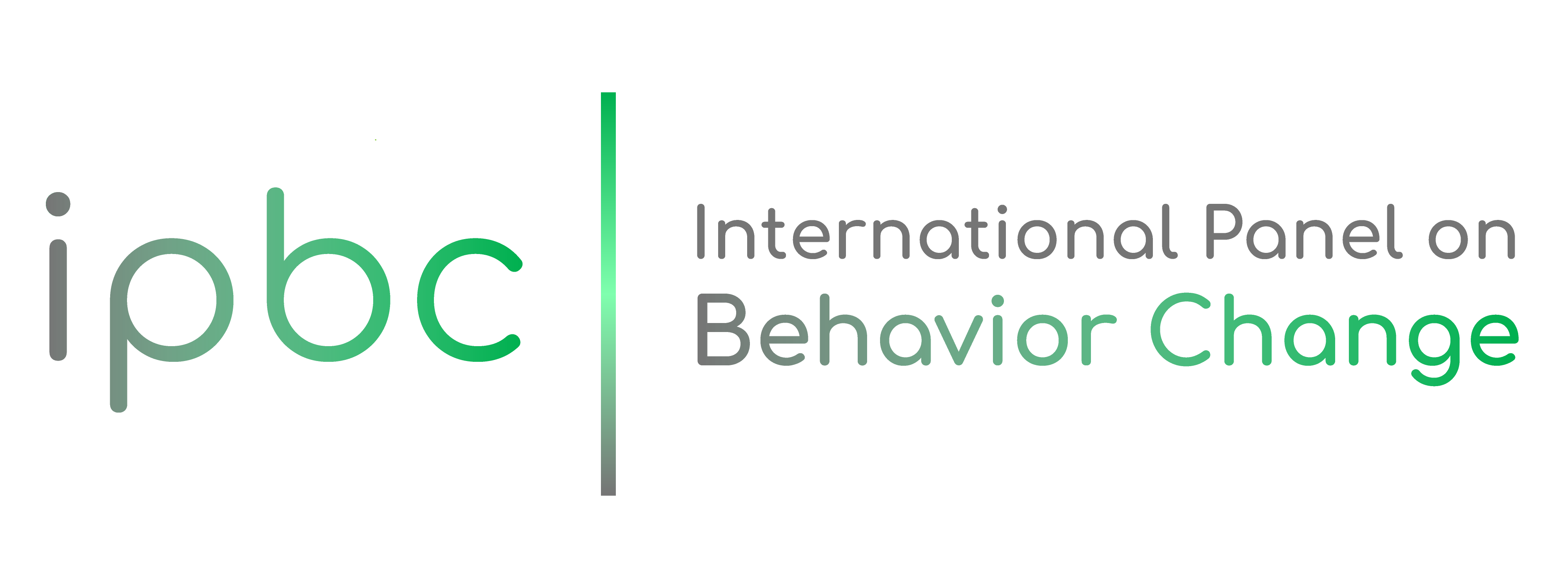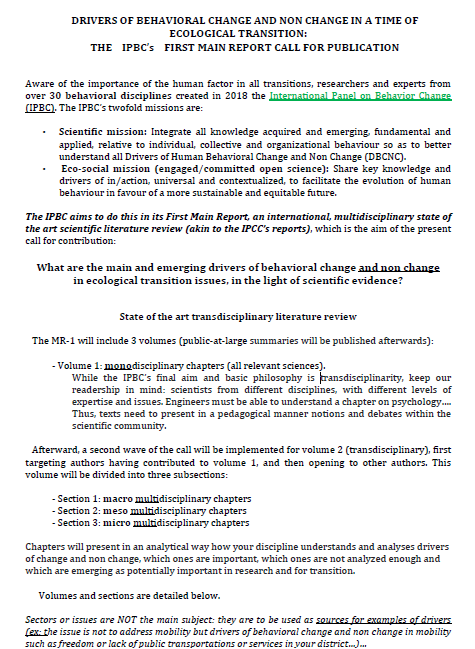First Main Report Project
"Individual, collective and organisational drivers
of Behavioral Change and Non Change".
First MAIN REPORT Project - Summary & Roadmap
UPDATES ON THE FIRST REPORT PUBLICATION PROCESS
Stéphane La Branche (IPBC Scientific Coordinator): stephane.labranche@ipbc.science
Camille Lefrançois (IPBC General Secretary): camille.lefrancois-coutant@ipbc.science
July 15, 2023:
Even in ‘purely’ scientific issues, such as the climate, biodiversity or health crises (ex: Covid!) or in everyday operation and decisions as well as management, the human factor is absolutely fundamental both as the causes of these crises but also as sources of solutions! In other words,
Solving even a scientific or technical problem requires the integration of the human factor.
The call for publication for the first volume has already received an important number of proposals for chapters, with over 45 authors from 20 countries, 14 disciplines, 35 universities and research institutes and covering a wide range of subjects at the heart of behavioral change and non change such as: behavioral sciences, communication sciences, ecology, health and environment, management, medecine, human behavior modeling, neurosciences, nursing, psychology, semiology, social medicine, sociology, socioeconomics, zoosemiotics…
The first version of the completed chapters is expected by fall 2023. All will address with their own understanding and tools the pressing issue of drivers of behavioral change and non change. Then, the second volume will propose several transversal and multidisciplinary chapters, but more to come by the end of 2023.
Researchers are from the following countries: Australia, Belgium, Brazil, Canada, Colombia, Cyprus, Denmark, Estonia, France, Germany, Ireland, Israel, Italy, Netherlands, Portugal, South Africa, Sweden, Switzerland, UK, USA…
Looking forward to this great scientific adventure!
Beyond its obvious scientific interest, the IPBC’s First Main Report (PR-1) aims to:
• Undertake a review of the multidisciplinary literature in behavioral sciences. What do law, psychology, neurobiology, sociology, economics, ergonomics and so on say about drivers of behavioral change and non-change (DBCNC)? About 30 disciplines are already represented by IPBC scientists;
• Report also on what these sciences do not know and which knowledge could be useful and important to understand, so as to propose i) empirical solutions to obstacles to change and ii) new areas of research;
• Draw the attention of scientific, private, public, media and civil society actors to the importance of i) taking the human factor into account in transitions and to ii) the IPBC work on this issue.
November 08, 2023:
THE 1ST IPBC MAIN REPORT (MR-1), “FACTORS OF BEHAVIORAL CHANGE AND NON-CHANGE IN TRANSITION TIMES” IS NOW IN THE WRITING PROCESS!
Indeed, we already received the first chapters of Volume 1, with a total of nearly 50 authors, from over 20 countries and over
30 disciplines and sub-disciplines (including early Vol.2 chapter proposals).
The diversity of issues and questions addressed provide an excellent overview of how the IpbC will contribute to the understanding of drivers of individual, collective and structural behavioral change and non change.
As for Volume 2 (with transdisciplinary chapters), it is ahead of schedule, with 4 chapter proposals already received!
The official call for publication for Vol. 2 will take place at the end of November.
VOLUME 1: MONODISCIPINARY CHAPTERS – short abstracts
– Blanco, D. Gotteland, O. Trendel (Grenoble School of Management, France): “The role of implicit cognition in firms’ pro-environmental efforts”.
Issue: Do unquestioned, norms perceived as obvious, slow down or accelerate change efforts at the institutional level, which ones and why?
Discipline: management sciences and management.
– Bonaiuto, V. Vitale (University of Rome, Italy): “Sociopsychological interventions as a factor of change for transition”.
Issue: Do existing individual and collective measures aimed at change work, to what extent, why, and under what conditions?
Discipline: Psychology of development and socialization, environmental psychology.
– Couvet (Center for Ecology and Conservation Sciences, CNRS, France), E. Bessa (Univ. of Brasília, Brazil): “Towards an ecological citizenship inclusive of human and non-human: potential impacts on behavior”
Issue: What role does our perceptions of non-human rights, and perceptions of our relationships to them, play in efforts for change?
Discipline: Biodiversity, sustainability sciences.
– Farahabakhsh, M. Anand, C. Bauch (Univ. of Guelph, Canada): “Modeling the factors of change and non-change of behavior in human-environment systems”.
Issue: What are the challenges, learning and the usefulness of modeling human behavior in an ecosystem?
Discipline: modeling behavior changes.
– Fieulaine (CNRS, France, and colleague (New Zealand): “The impact of the relationship with time on changes in behavior”.
Issue: What is the role of time and its perception (e.g. mobility and the nanny’s deadline in the evening…) in daily-life behavioral efforts?
Discipline: social psychology.
– G. Grunert (Aarhus Univ., Denmark): “The relative weights of cognition, information and emotions in behavior”
Issue: What is the role and relative weight of these three factors in efforts (measures, etc) to initiate and sustain practice and organizational changes?
Discipline: management sciences and management.
– Guyatt (United Nations PRME Working Group on Sustainability Mindset): “Beyond data: the behavioral factors that slow down virtuous investments by investors”.
Issue: Which factors lead companies to engage or not in investment congruent with ecological transition?
Discipline: Management sciences and management.
– Jalin and C. M. Daouda (Univ. of Nantes, France); A. Sapin (Catholic University of Louvain, Belgium): “Can ecoanxiety save the planet?”
Issue: Anxiety sometimes leads to paralysis, denial or, on the contrary, to radical actions. Why is this the case or not?
Discipline: Psychology.
– Saint-Charles, S. Yates, C. Alloing, A-S. Gousse-Lessard (Univ. of Quebec in Montreal, Canada): “The role of communication as a factor in behavior change”.
Issue: What are the effects of communication, its modes, its contents, its vectors and its sources, on practices?
Discipline: Science communication.
– Carlos A. Trujillo (Univ. Dos Andes, Columbia): “Poverty as a factor of behavioral changes for sustainable lifestyles?”
Issue: What role does poverty play in the perceptions and practices associated with the transition?
Discipline: economics.
– Steiler (UNESCO Chair for Economic Peace, Grenoble management school, France): “Conflicts and construction of peace in business”.
Issue: What are the methods and factors which in a company lead to or block well-being, and the emergence of new corporate cultures?
Discipline: management sciences.
MR1: for more information, click below.

